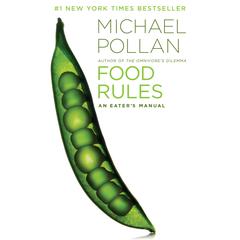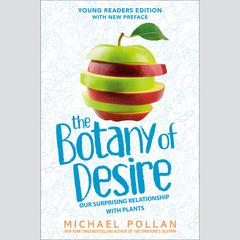 Play Audiobook Sample
Play Audiobook Sample
The Botany of Desire: A Plant's-Eye View of the World Audiobook
 Play Audiobook Sample
Play Audiobook Sample
Quick Stats About this Audiobook
Total Audiobook Chapters:
Longest Chapter Length:
Shortest Chapter Length:
Average Chapter Length:
Audiobooks by this Author:
Publisher Description
The book that helped make Michael Pollan, the New York Times bestselling author of Cooked and The Omnivore’s Dilemma, one of the most trusted food experts in America In 1637, one Dutchman paid as much for a single tulip bulb as the going price of a town house in Amsterdam. Three and a half centuries later, Amsterdam is once again the mecca for people who care passionately about one particular plant—though this time the obsessions revolves around the intoxicating effects of marijuana rather than the visual beauty of the tulip. How could flowers, of all things, become such objects of desire that they can drive men to financial ruin? In The Botany of Desire, Michael Pollan argues that the answer lies at the heart of the intimately reciprocal relationship between people and plants. In telling the stories of four familiar plant species that are deeply woven into the fabric of our lives, Pollan illustrates how they evolved to satisfy humankinds’s most basic yearnings—and by doing so made themselves indispensable. For, just as we’ve benefited from these plants, the plants, in the grand co-evolutionary scheme that Pollan evokes so brilliantly, have done well by us. The sweetness of apples, for example, induced the early Americans to spread the species, giving the tree a whole new continent in which to blossom. So who is really domesticating whom? Weaving fascinating anecdotes and accessible science into gorgeous prose, Pollan takes us on an absorbing journey that will change the way we think about our place in nature.
Download and start listening now!
"When I checked this audio book out of the library, I wasn't sure how interested I was in the book. I was just looking for anything science related. But once I started listening to it, I was hooked. It meanders a bit, and there is certainly a heavy amount of opinion from the author. But it explores interesting ideas and presents some history of apples, potatoes, tulips, and marijuana. As someone who never did much gardening, it is fascinating to ponder the implications of the domestication of plants."
— Carmen (4 out of 5 stars)
The Botany of Desire Listener Reviews
-
" Mind blowingly good. I consider this the best of Michael Pollan, which is about as good as it gets for this genre. It's main takeawat is that plants domesticate us just as much as we domesticate them. Yay for mutual exploitation! "
— Olga, 2/12/2014 -
" Great read and history about plants we take for granted. "
— Joe, 2/10/2014 -
" I may never eat potatoes again. "
— Knittingshelley, 2/9/2014 -
" Amusing, well-written book with lots of trivia that I found very interesting. Learned things about Jonny Appleseed, for example, that no one had ever mentioned before. Best chapter was about apples which are far more fascinating than I thought possible. If you like nature and are interested in gardens and plants, this is a good book. If not, probably too much detail. "
— Kevin, 2/2/2014 -
" A great read about the evolution of agriculture from Johnny Appleseed to Monsanto. I could have done without so much about pot. Pollan spent a lot of time talking about how bad monoculture and cloning are (diseases become stronger, the plants become weaker, etc) but when it comes to weed, those things seem to be good. I'm not sure if he was trying to justify or encourage marijuana usage or cultivation, but that chapter seemed out of place with the overarching message of the book. "
— Josiah, 1/31/2014 -
" Not as good as Omnivore's Dilemma but good writing and lots of new information for me at least. "
— Eric, 1/14/2014 -
" 4 great storrirs of interspecies interaction "
— Jonathan, 12/10/2013 -
" I learned so much reading this book! "
— Annette, 12/3/2013 -
" Think of us serving the desire of the tulip to spresad its genes. "
— Ai-Ling, 8/26/2013 -
" Pollan is an excellent science writier (and speaker, if you ever get the pleasure of hearing him in public). After an epiphany in his garden, when he realizes plants are using him rather than vice versa, he dives deeper into the relationship between four diferent plants and humans. "
— Shelley, 8/8/2013 -
" great book to bring respect & understanding of the world's 4 most sought after plants: potato, apple, tulip & cannabis "
— Joshua, 4/6/2013 -
" Some interesting thought provoking ideas hidden in a lot of dribble. "
— Lily, 8/11/2012 -
" an really great examination of the history of food - at least three key foods that have shaped our lives and our world "
— Tracy, 3/26/2012 -
" A great read - four simple chapters but Michael Pollan gets a lot of value out of his four examples - four plants, four human desires, and a narrative that ties them all together. This will change the way you relate to plants. "
— James, 11/1/2011 -
" I found this book more like a textbook which was not what I expected. It did, however, provide insights by the author which were very interesting in terms of how humans and animals interact with plants. "
— Edie, 9/4/2011 -
" How plants have influenced human desires - for sweetness, beauty, intoxication and control - as shown by the apple, the tulip, marijuana and the potato. "
— Annie, 9/1/2011 -
" Made me want to learn more about Johnny Appleseed. "
— Dustin, 8/6/2011 -
" Didn't hang together as a solid book for me - more like 4 short stories. But I was fascinated with each one, so it's ok. "
— Diane, 5/16/2011 -
" I love the history of things as well as people. Michael Pollan does a wonderful job of pulling us through the historical development of four common items. Not for anyone who needs a lot of action in their books. "
— Judith, 5/6/2011 -
" Such a fascinating read. Essentially the author's premise is that man thinks he controls food, but food controls man, by pandering to our desires. Nice narrative, exciting non-fictional read! "
— Judith, 4/27/2011 -
" This book provided me a new way to look at the way that humans and plants have interacted throughout history. It was also a good introduction to monoculture and genetically modified foods (GMO). I found the apple and potato sections especially eye opening. "
— Jenn, 4/22/2011 -
" One of my first books from Michael Pollan. I thought the Omnivores dilema was better. "
— Bill, 4/19/2011 -
" Did not enjoy this as much as his other books. Some salient points but a bit dry. Too much usage of Apollo and Dionysus.<br/> "
— Sharon, 4/16/2011
About Michael Pollan
Michael Pollan is the author of twelve books, several of which were New York Times bestsellers. In Defense of Food and How to Change Your Mind made the #1 spot on the New York Times bestsellers list. A long-time contributor to the New York Times Magazine, he teaches writing at Harvard University and the University of California, Berkeley. In 2010, Time magazine named him one of the one hundred most influential people in the world































